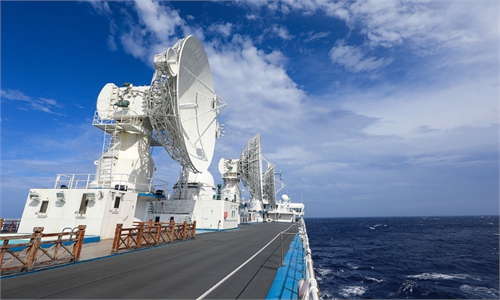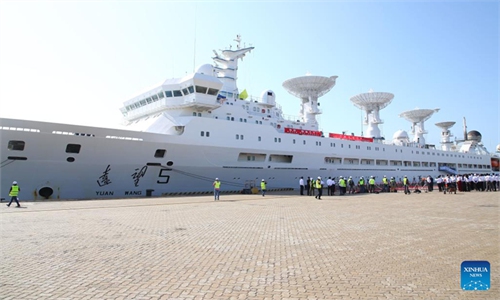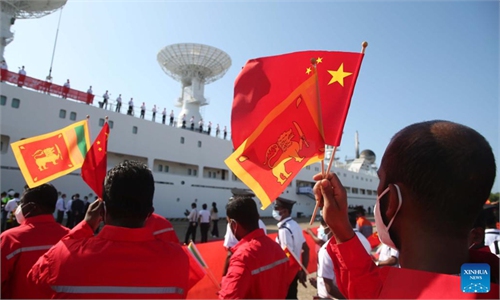IN-DEPTH / DIPLOMATIC CHANNEL
China’s rapid development inspires Sri Lanka out of predicament: Sri Lankan Ambassador
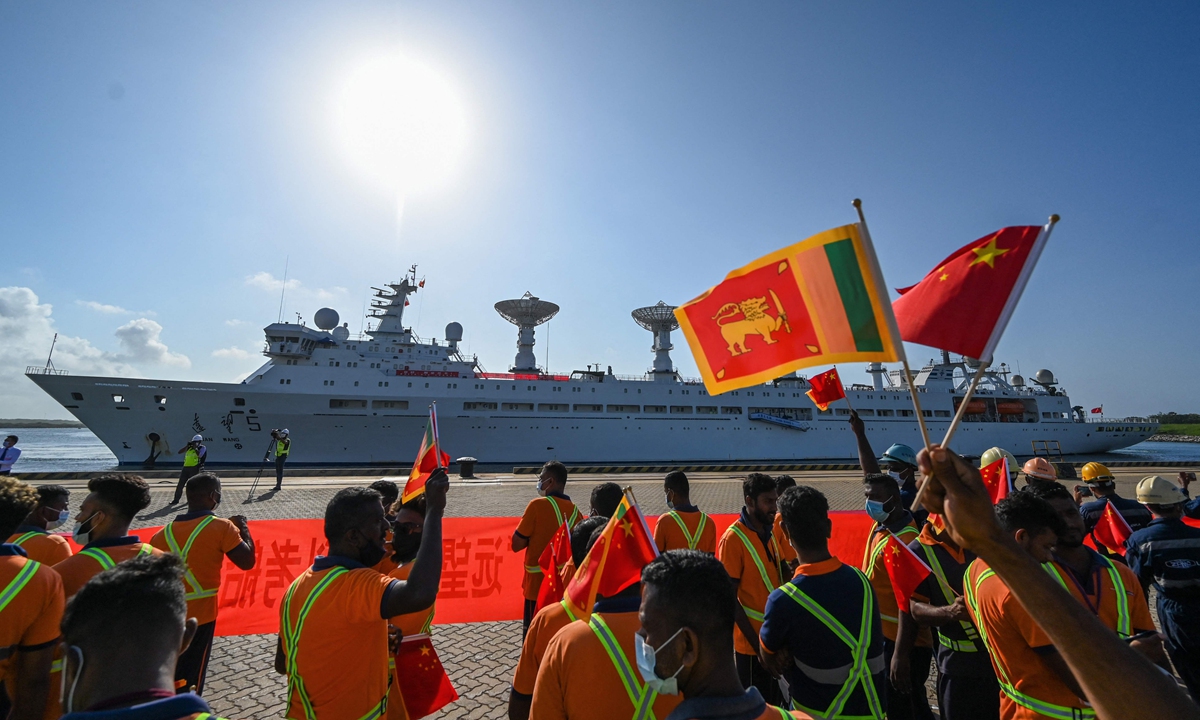
Workers wave the Chinese and Sri Lankan national flags upon the arrival of China's research and survey vessel, the Yuanwang-5 at Hambantota port, Sri Lanka on August 16, 2022. Photo: VCG
There are lots of posters pinned everywhere at the Embassy of Sri Lanka in China, including along the fence outside highlighting significant milestones in the long-abiding friendship at the 65th anniversary of the establishment of diplomatic ties between China and Sri Lanka this year; several staff members busied themselves preparing the ambassador's recommended Sri Lankan Ceylon Black Tea and coconut water for the livestream session of upcoming 2022 China International Fair for Trade in Services held in Beijing."In the last decade, China has developed rapidly and has become the biggest source of foreign direct investment and the second biggest economy in the world, during which time, Sri Lanka's bilateral relations with China have expanded substantially and have prospered. Today, we hope that we can use these bonds to advance Sri Lanka's development," Sri Lanka's Ambassador to China, Palitha Kohona, told the Global Times in an exclusive interview.
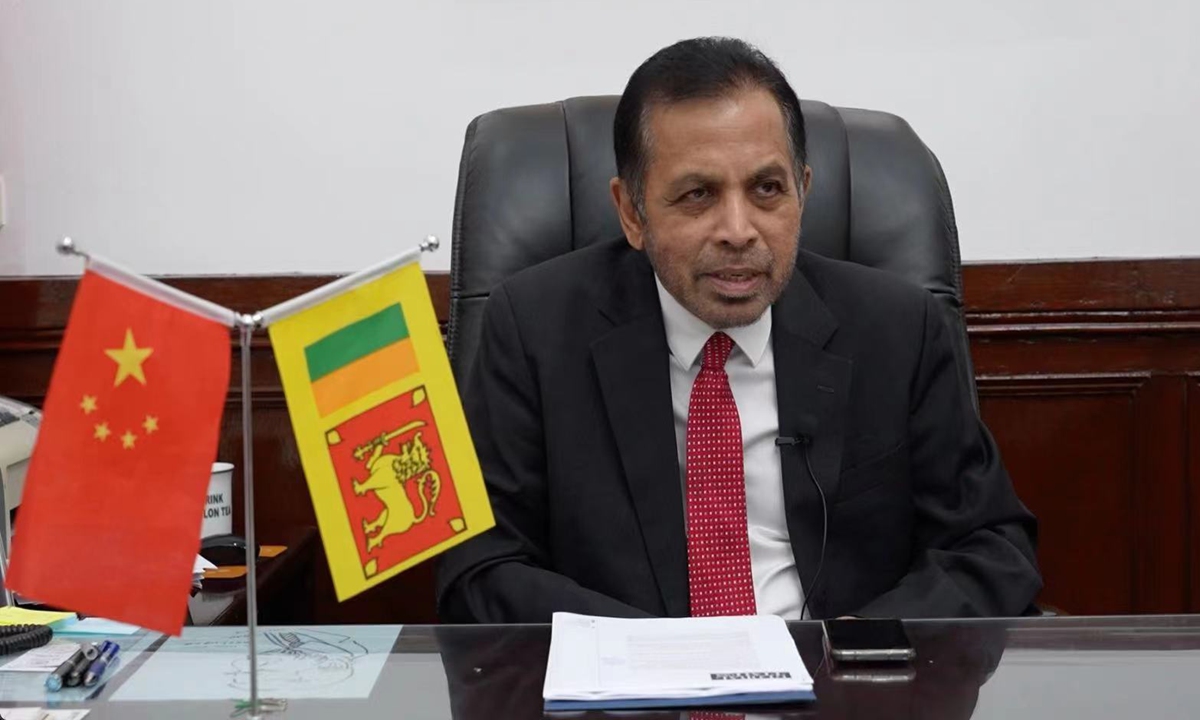
Sri Lanka's Ambassador to China Palitha Kohona during an exclusive interview with the Global Times. Photo: Li Jieyi/GT
Kohona noted that over the last 65 years, Sri Lanka and China have lent mutual understanding and support to each other, maintaining a close friendship and seeking the common goal of development. Since the start of the COVID-19 global pandemic, the two sides have adhered to the spirit of mutual assistance, jointly fighting the pandemic. During the economic crisis confronting Sri Lanka, China has provided emergency humanitarian assistance, further reinforcing the historically close bonds."Sri Lanka-China relationship enjoys a time-honored history. Most recently, from the Rubber-Rice Pact, Sri Lanka and China have provided support and assistance to each other during many important periods of each other's national development and have been reliable strategic partners. This relationship can be strengthened further in the future," Kohona said.
According to Kohona's observations, official and civil interaction between Sri Lanka and China over the last decade has covered a range of activities and projects in both countries, and both populations entertain a positive impression of each other.
"China's Belt and Road Initiative and China-funded projects have made important contributions to Sri Lanka's economic development. Earlier, I was at the Tsinghua University and found that there are many students from Sri Lanka who hope to go back and work in Chinese companies operating in Sri Lanka," Kohona said.
Kohona also mentioned that China has been a strong advocate of globalization. Sri Lanka has benefited from and firmly supports globalization.
China's campaign to consolidate globalization has been welcomed. Globalization has created wealth and prosperity. Many developing countries have been able to lift vast numbers of their populations out of poverty because of globalization, because globalized connectivity allows countries' exports to reach more lucrative markets easier, Kohona pointed out.
"We applaud China for its extraordinary achievement in lifting its population from absolute poverty," he said.
Kohona said he has visited China over 18 times over the last few years, and seen China transform from poverty to prosperity.
"Today, China has fabulous modern cities, a very impressive highway network, the most impressive high speed rail network in the world and eye-popping technology. And most cities are very green," Kohona noted, adding "What China has done under the dedicated leadership for the Communist Party of China (CPC) is remarkable. It's unique. No other country has achieved the goal of eradicating extreme poverty at any time in history, while China has done this impressively."
Kohona believed one of the reasons for such a dramatic shift in China is that the CPC has adopted very clear people-centric policies. "It's not focused toward a specific group. It's a development that takes into account the average person. I think the firm and very carefully calibrated policy that China has adopted could be something that we can learn from. But China's path is its own, its own model toward development," he siad.
Kohona said Sri Lanka also wants to eliminate extreme poverty, creating a better life, and ensuring a better living standard for its people.
Sri Lanka currently is facing a myriad of challenges, and has many lessons to learn from China, such as the country's scientific education system and the government's emphasis on nature conservation, the ambassador noted.
"All these have contributed, in my view, to making the remarkable and very impressive China of today. Sri Lanka has been inspired, but will have to find its own strengths and work on them to become a country like China in the future," Kohona said.
